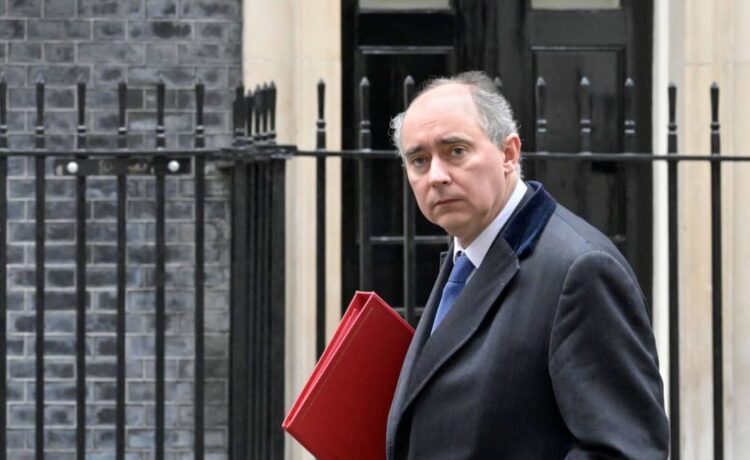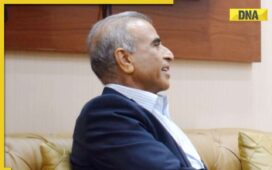Americans might not think they have something to learn from the experience of the British economy, but they would be wrong. Free trade and fiscal discipline are on the ballot in November 2024, and in the recent past, the United Kingdom touched the stove on both issues and came away singed.
Just ask U.K. Investment Minister Dominic Johnson, who stopped by the Barron’s newsroom last week on a trip through the U.S., part of his ongoing efforts to drum up investment into the U.K. Brexit has forced the country to look farther abroad for sources of growth, and Johnson and his colleagues in the Conservative government of Prime Minister Rishi Sunak face intense global competition.
The U.S. and U.K. economies are of vastly different scales, to be sure, and the U.S. benefits from unique advantages, including the role of the dollar as the world’s reserve currency. But the coming years are likely to test American exceptionalism, and investors who want to understand what’s coming will find clues in Johnson’s experience.
“As a marketer of the U.K., predictability and stability is 98% of what I’m selling,” says Johnson. “Without predictability and stability, the rest of the premise for investment doesn’t exist. Your cost of capital is so high as to make the returns far less attractive.” That instability is the hallmark of emerging markets, which Johnson knows well. He co-founded an EM hedge fund, Somerset Capital, in 2007.
The U.K. had a brush with emerging-market-level instability in 2022. Then-Prime Minister Liz Truss’ new government surprised markets with plans for unfunded tax cuts, sparking dramatic moves in bond yields and forcing an emergency intervention from the Bank of England. Truss resigned, making her one of the U.K.’s shortest-tenured prime ministers.
Advertisement – Scroll to Continue
U.K. markets recovered, but Johnson says he had to fight negative investor perceptions for some time. Last year, he says, “we had come out of an unusually tumultuous period of British politics, with three prime ministers in a month, which is probably two too many. And I think there was just a sort of sense of ‘Where’s the U.K. going now?’ And I don’t necessarily think we projected our post-Brexit vision of Britain properly at that stage.”
His reception this year has been far better, he says. Crucial to that post-Brexit vision is an effort to scour the world for economic opportunities. “The U.K. is really the only economy, I think, that is still opening up its economy to trade deals,” Johnson says. It has signed on to the agreement that replaced the Trans-Pacific Partnership after the U.S. abandoned it in 2017.
The U.K. would love a trade deal with the U.S., its largest trading partner, but that question is now frozen until after the November 2024 election. “Protectionism has sadly become very popular. And that’s not healthy, in my view, for the U.S. economy,” he says.
Advertisement – Scroll to Continue
The U.K. is finding its ways around a frozen U.S. political process. It signed a memorandum of understanding with the state of Florida last year, and is targeting California, Colorado, Illinois, and Texas.
U.K. voters will get their say on this strategy. An election is due within the next year. Polling shows Labour ahead, though Johnson argues a strengthening economy may dash forecasts.
The electorate’s views of the rising cost of living will be crucial. The Bank of England opted to hold rates at 5.25% at its last meeting, with inflation running at 4% annually as of December.
Johnson believes higher rates are here to stay, in contrast to his hedge fund days. “The reality is, we enjoyed ourselves. Had a great time. Everyone likes free money,” he says. But that longer-term period of low rates had a cost. “It actually caused enormous issues in terms of asset-price inflation at the time, when wage inflation didn’t keep pace with it, and that has concomitant knock-on effects to society and politics.” A long-term rate of 2.5%-3.5% will be healthier, he says.
The U.K.’s investment strategy has also sidestepped questions that have confounded U.S. politics. Plans by auto maker
Advertisement – Scroll to Continue
to join with Chinese battery maker CATL have provoked intense controversy in the U.S. The U.K. government sees leadership in clean technologies as vital to its global competitiveness. If China can help, so be it.
“We already have Chinese battery companies operating in the U.K.,” Johnson says. “From my point of view, I think getting Chinese investment in those areas is actually really welcome. And I’d be delighted if one of the big Chinese car companies decided to base themselves in the U.K.”
Advertisement – Scroll to Continue
Success is not assured in the U.K.’s plans to trade its way out of the post-Brexit doldrums. The International Monetary Fund forecasts 0.6% growth this year, compared with 2.1% in the U.S. Britons would surely be happy to swap their numbers for ours.
But America’s exceptional growth comes in part from debt-financed government largess. Unbridled deficit spending represents a bet that the buyers of U.S. debt won’t revolt. And even with massive federal subsidies, the path toward U.S. leadership in technologies like batteries is murky. Few U.S. politicians are willing to stand up for trade as a source of growth.
It may be that our metaphorical stove isn’t hot, and we can touch it with impunity. But it might be better not to try.
Write to Matt Peterson at [email protected]





